UK Sport's Elite Programme aims to enhance and develop current world class coaches from the the British system, to help continue their learning and enable them to remain truly world class coaches.
In April 2019, nine of Britain's leading coaches from a variety of Olympic, Paralympic and non-Olympic sports, graduated from the rigorous three year development programme.
In the first in a new series, we caught up with British Swimming coach Mel Marshall one year on to talk about her memories of the course, the importance of cross-sport leanings and the difference her athletes have seen in her.
What are the key things you remember from the Elite Programme?
There were three big takeaways for me. Firstly, the power of the cohort and the quality of conversation that took place within the group. The calibre of coach in the room was breathtaking and you could just learn so much from each other. The second thing was actually my final project which I was bit reluctant to do because I was really busy, but the ability to do a project in my way and present in a way which worked for me was really effective. Thirdly, the key workshops were great. I remember the hostage situation and the session where we visited the police. Some of the lessons I took away from those experiences were invaluable.
What in particular could you take from the workshops back into your daily routine?
I think what was quite interesting was the hostage situation because it stressed me to a really high level and made me think differently. It taught me patience and highlighted how much thought process has to go into every minute detail. It’s the same with sport really. It’s one giant conversation with the leadership team, support staff and athlete for one tiny bit of progress.
It also challenged you to think how you influence people, get your message across and know when the right time to act is and the right time to support is. Seeing how other people respond differently and become alive in certain situations was fascinating. We all had to sit in a different seat and watch how everyone else responded in different situations and that was very interesting to watch.

Did your athletes notice any change in you as a result of the course?
I don’t think the impact of the course really hit me initially, it’s probably been a bit more prominent over the past six or seven months. It’s almost like you go into this space and learn and absorb and think and reflect but you don’t have the ability to utilise that until much further down the line. If I think about how I react to certain situations now, I will draw on experiences from the elite coaching course to inform my choices as a coach.
I was learning at the time, but I wasn’t applying until much later – and if I was, I wasn’t applying them competently. Whereas now I feel I’ve gone through the process of absorbing it, then thinking about it, knowing it and now I think I’ve become it which is a really positive thing.
How much did you learn from your fellow coaches?
It was just an amazing group of people. Everyone was just so authentic and did things very differently. What I tried to take from that was trying to spot and adopt people’s strengths and adapt them to my style. For example, Gareth (Southgate, England Men’s Football Manager) has this amazing ability to seem interested and ask really good questions. Paula (Dunn, Head Coach for British Athletics Paralympic Programme) has this amazing energy and a really kind and caring nature and then Peter (Sheppard, GB Rowing Chief Coach) is incredibly strategic and methodical.
I wanted to observe some of those traits and try to embed them into my coaching style. The quality of the conversation was also amazing. I remember having a conversation with Mark (Ratcliffe, Canoe Slalom Head Coach) about the hierarchy of who controls the music in a swimming environment and he was talking about who has what position in the boat shed, and it was so interesting because we were going through the same thing but with different examples.
We all had so many shared experiences about the high-performance system and topics like confrontation, ideas, personality and all that sort of stuff and it was invaluable just to discuss our experiences with each other.

How useful was it to have the mix of sports in your cohort?
I think the cross-sport mix is essential. You can learn so much from each other’s sports and there’s a lot of things that are very similar to share. Being from different sports also allowed you to be a lot more open and you feel non-judged and you can be really honest and open. There’s an instant bond without any perceived threat.
How do you see UK Sport’s role in the coach development programme?
I think the big thing was the power of intimacy and we can’t lose that. The amazing thing about this course was it was so bespoke, so personalised and so tailored to the individuals involved. When you look at the people who contribute to your system and contribute to your success, I do think you have to look after them physically and emotionally on a really intimate basis. The great thing about this course was the balance between the generic content and then you had your tailored programme off the back of that. I think that’s what made it so powerful throughout the journey.
UK Sport remain grateful to The National Lottery and their players for their on going support for Great Britain's elite athletes. Since 1997, National Lottery good causes have supported British athletes to reach their full potential by enabling them to have access to some of the best coaching, facilities and support staff in the world.